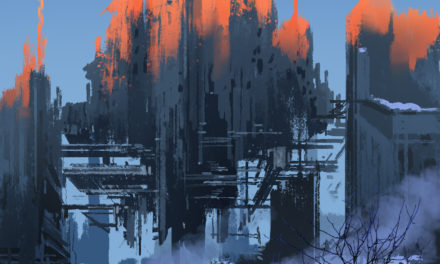Letter from the Editor
by Meera Velu
Issue 11: Governance
Welcome, readers, to the Spring 2021 issue of Speculative City.
To start off, we’ll come clean: governance, the issue theme, was conceived with politics strongly on the mind. You can’t blame us; we were in the midst of a contentious national election cycle while simultaneously contending with a global pandemic. Already critical of how the country was being led—by whom and for whom—we wondered on what could be.
That speculation brought us right back to the magazine. Cities encompass a wealth of resources, and—as both institutions and lived spaces—they act as visible sites of governance. We saw this issue theme as an opportunity to investigate the elements that guide and mechanize a city and its populace. Such guidance can come through political leadership, culture, or even through individual perception—one’s use of a physical space will affect their experience of it.
The works of this issue exhibit these many facets of governance. The first fiction, Wen-yi Lee’s “The 74th District,” examines the theme within the political body, following a day in the life of a newly appointed leader for the undead. This story reveals an often unspoken detail that comes with overseeing and running the affairs of a constituency: personal investment. And yes, contrary to popular depictions, it appears zombies can be ruled.
Ella Anañeva’s “The Face Thief” moves away from governance within traditional institutions. In the context of a well-worn story of exploitation, the piece delves into the social mechanisms that drive our actions and how we may define our identity in a world increasingly surveilled. The young female protagonist, burdened by cultural and familial obligations, runs away to join a high-crime syndicate, only to find her actions fatally backfire.
And so interpersonal relationships may govern our lives more than we wish or imagine. In “Road Rage,” Lyle Enright focuses on a father-daughter dynamic in a world experiencing transformational change. This change comes—in a shout out to COVID-19—through a new ailment that commands how individuals must interact with each other and their environment. What may harrow a reader the most in this story is not the disease, though. More frightfully, we see how control and power can switch at the blink of an eye.
The issue’s poetry takes a more subdued, though similarly existential direction with “The Indifferent Song of C. Acer.” Mari Ness, through a reimagination of Prufrock in a post-industrial landscape, gives readers an elegy for a time with clearer structure and direction.
Maya Beck’s essay “The Avatar and Great Men” closes the issue with an important call—one we join with loud voices—for inclusion and diversity in artistic spaces. By analyzing the misrepresentation of Eastern cultures in Avatar: The Last Airbender and contrasting the show’s makeup with those of the studios that have produced Japanese comics and Adventure Time, Beck emphasizes the advantages of including voices that have been relegated to the periphery.
We hope you enjoy! And don’t stop speculating.




